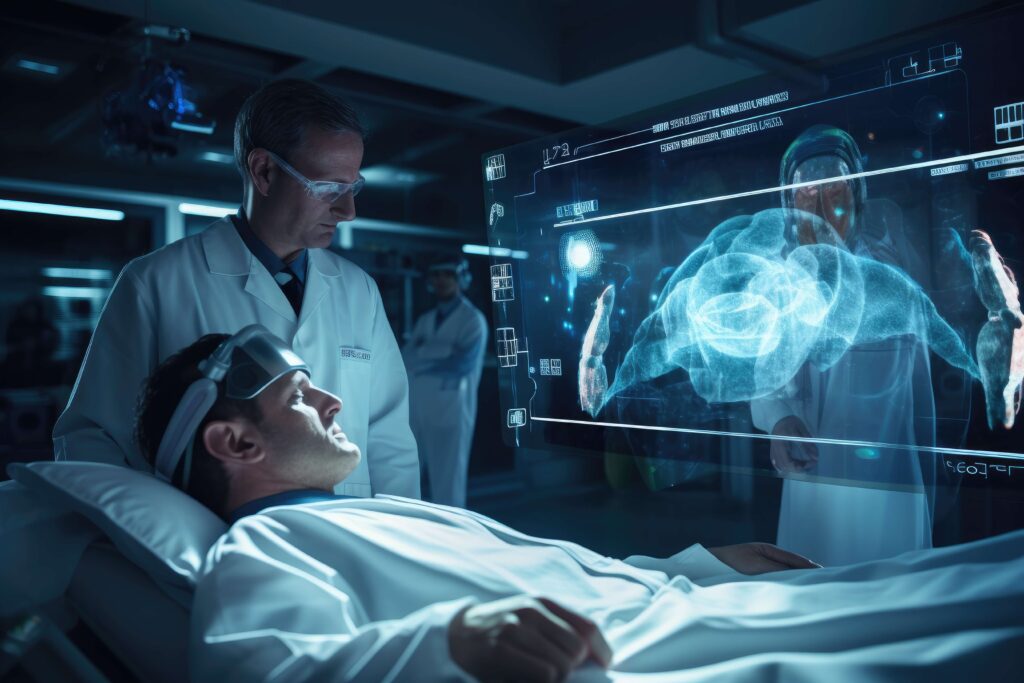Artificial Intelligence (AI) is no longer a thing of the future — it’s happening now, The AI Healthcare and it’s transforming healthcare faster than you can say “machine learning.” From speeding up diagnoses to personalizing treatment plans, AI is bringing massive improvements to patient care, doctor workflows, and medical research.
In this post, we’ll explore how AI is reshaping the healthcare landscape in 2025 and beyond. 🌍
Smarter Diagnoses with The AI Healthcare🩺
Let’s face it — even the best doctors can miss things. But AI? It’s trained on millions of data points. By analyzing patient history, test results, and imaging scans, AI-powered tools like IBM Watson or Google Health can assist doctors in diagnosing conditions more accurately and much faster.
For example:
- AI can detect early signs of cancer in radiology scans 📷
- Chatbots help assess symptoms and recommend next steps 🤖
- Machine learning models spot patterns that even seasoned doctors might overlook 🔍
This doesn’t mean doctors are being replaced — AI is just helping them be even better at their jobs.
Personalized Treatments Just for You 💊✨
Not every patient is the same — so why should treatment be one-size-fits-all? AI enables personalized medicine by analyzing genetic data, lifestyle choices, and clinical records to design treatment plans that are tailored to you.
💡 Imagine getting a cancer treatment that works best for your DNA profile. That’s not sci-fi anymore — it’s already being tested in hospitals worldwide.
Plus, wearable devices like smartwatches track your health in real time. AI analyzes this data to adjust medications, monitor vitals, and even alert doctors if something seems off. Pretty cool, right?
Faster Drug Discovery and Development ⚗️⏱️
Let’s not forget how long and expensive drug development is — often taking 10+ years and billions of dollars. AI is cutting that time in half by:
- Predicting how new compounds will react in the body
- Identifying potential drug candidates quickly
- Running virtual clinical trials before real ones even start
According to AllTechFinder.online, pharma companies using AI are now bringing drugs to market faster than ever — and at a fraction of the cost. That’s a game changer for global health.
AI in Hospitals: Boosting Efficiency 🏥⚙️
Hospitals are busy. From managing records to scheduling appointments, admin tasks often slow things down. AI-powered automation is fixing that.
📋 Electronic Health Records (EHR) systems now use AI to:
- Auto-fill forms based on past entries
- Flag potential errors or missing data
- Suggest coding for billing and insurance
Also, virtual assistants are helping patients schedule visits, get reminders, and even ask questions without waiting on hold. Less paperwork = more patient care.
Predicting and Preventing Diseases 🔮🧬
One of the most exciting uses of the AI healthcare is predictive analytics. Instead of waiting for someone to get sick, AI can analyze risk factors and predict the likelihood of developing diseases like diabetes, heart failure, or Alzheimer’s.
This gives doctors a head start to:
- Recommend lifestyle changes early
- Monitor high-risk patients more closely
- Prevent conditions before they become life-threatening
Prevention is better than cure — and AI is making that more possible than ever.
Challenges and Ethical Concerns ⚠️🤔
With all these amazing benefits, it’s easy to forget the AI in healthcare also comes with challenges:
- Data privacy is a big concern. Medical records must be protected.
- Bias in algorithms can lead to unequal treatment outcomes.
- Over-reliance on machines might reduce the human touch in healthcare.
That’s why regulation, transparency, and ethical use of AI are more important than ever.
👉 Check out more on AI ethics and transparency at AllTechFinder.online!
Final Thoughts 💬
AI isn’t here to replace doctors — it’s here to empower them. Whether it’s diagnosing diseases faster, customizing treatments, or streamlining hospital workflows, AI is revolutionizing the healthcare industry from top to bottom.
As the tech continues to grow, so will its role in saving lives, reducing costs, and improving outcomes for everyone.
If you’re as fascinated by AI as we are, explore more future tech topics at AllTechFinder.online — your one-stop hub for everything tech! 🚀
FAQs 🤓
Q: Will AI replace doctors in the future?
A: No, AI is designed to support, not replace. Doctors still make the final decisions — AI just gives them better tools.
Q: Is AI used in mental health care?
A: Absolutely. AI chatbots are being used to provide mental health support and detect emotional distress early.
Q: Is my medical data safe with AI tools?
A: If managed properly with encryption and compliance with laws like HIPAA, yes. But always ask your provider about data protection.
